The results of the Australian Election Study (AES) for the 2019 federal election have now been released, providing valuable insights into why Australians voted how they did.
Following each election, the Australian National University (ANU) undertakes a survey of Australian voters to find out about their attitudes to issues, politics and the election. This year the AES surveyed 2,179 voters and released two reports—one on the 2019 election and one on AES trends over the past three decades.
The 2019 survey results suggest that Australians are still not particularly pleased with the state of politics or their choice of who to vote for. The proportion of respondents who reported that they always voted for the same party continued to slowly decrease, and fewer than one in three voters followed a party's how-to-vote card.
Fewer respondents reported an interest in politics and satisfaction with democracy declined slightly, reaching its lowest levels since the constitutional crisis of the 1970s. Trust in government continued to trend downwards, reaching its lowest level on record, with the survey recording slight increases in the proportion of respondents who believe that people in government look after themselves and those who believe that politicians don’t know what ordinary people think. While these indicators have continued to trend downwards, the decline has not generally been as marked as that seen at recent elections.
Trust in government
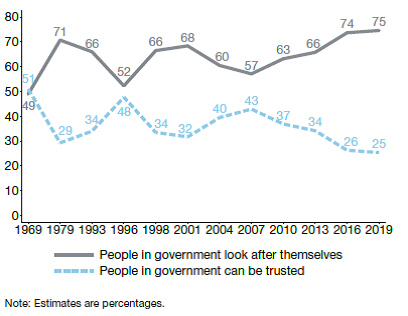
Source: Cameron & McAllister (2019)
Satisfaction with democracy
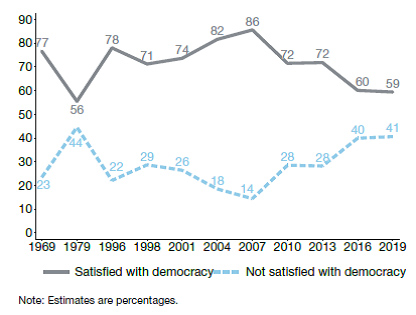
Source: Cameron & McAllister (2019)
However, support for compulsory voting increased slightly, and people were more confident that both their vote and which party was in power made a difference. These results suggest that, while voters might be disillusioned with the current state of politics, they're not ready to abandon electoral democracy quite yet.
Economic issues continued to be important to voters, with management of the economy rated the most important economic issue. Health was rated the most important non-economic issue. Almost half of all respondents reported that the Coalition was their preferred party for managing the economy, with Labor being the preferred party for health, the environment and climate change.
Compared to 2016 the proportion of voters who saw a good deal of difference between the parties increased substantially, and voters were more optimistic about the financial state of their households and the economy.
The 2019 election showed divides between men and women (with men more likely to vote for the Coalition); between generations (with the lowest Liberal vote occurring among voters under 35—the lowest on record—and the lowest Labor vote occurring among those 65 and over); and between classes, with working class voters more likely to vote Labor.
Age and vote choice
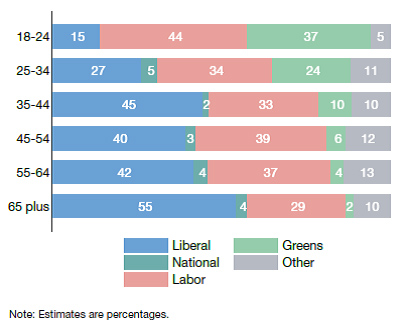
Source: Cameron & McAllister (2019)
Analysing the results, the authors concluded that the 2019 election result can be explained by voters swinging to the Coalition on the economy and leadership, and to Labor on the environment and health, with more voters swinging from Labor to the Coalition overall. While the environment was a significant issue for many voters (and an issue where voters tended to favour Labor), it was not sufficient to counteract the Coalition's advantage on economic issues and Bill Shorten's lack of popularity.
Preferred party policies
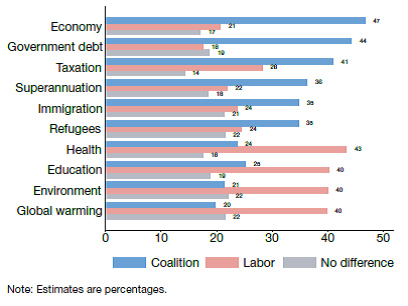
Source: Cameron & McAllister (2019)
Scott Morrison was very popular, particularly with Liberal voters; however, Bill Shorten was the second most unpopular main party leader on record for the survey. Although only a small number of voters reported that party leadership was important to their vote choice, many of those who did were swing voters.
Leadership popularity
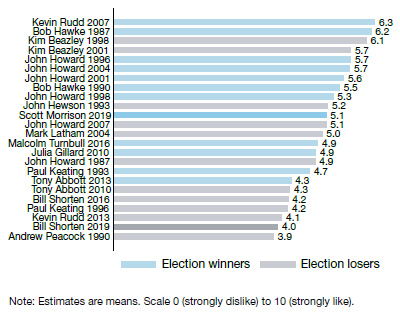
Source: Cameron & McAllister (2019)
As one of the few publicly released voter surveys in Australia, the AES is an important resource in helping understand the attitudes and voting behaviour of Australian voters. In addition to the reports, the data for the 2019 election survey, and for previous AES surveys, are available at the AES website.